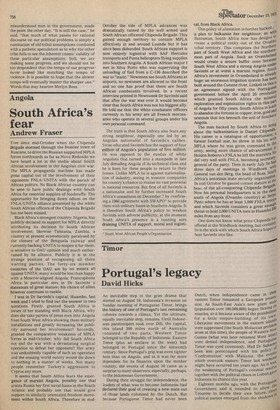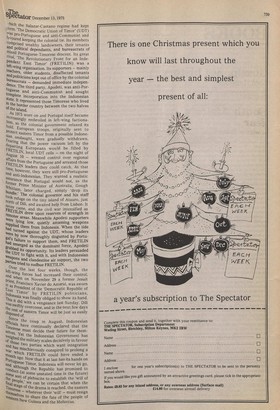Timor
Portugal's legacy
David Hicks
An inevitable step in the grim drama that started on August 10, Indonesia's invasion on Sunday morning of Portuguese Timor, brings the history of one of Portugal's last remaining colonies towards a climax. Yet the ultimate, equally inevitable step, remains. Until Indonesian paratroopers took over Dili, the capital, this island 300 miles north of Australia consisted of two parts. Western Timor belonged to the Republic of Indonesia. Eastern Timor (plus an enclave in the west) had belonged to Portugal since the sixteenth century. Since Portugal's grip was even tighter here than on Angola, and as it was far more dependent for its finances upon the mother country, the events of August 10 came as a surprise to many observers; especially, perhaps, to the Indonesian Government.
During their struggle for independence, the leaders of what was to become Indonesia had declared their goal of creating a new state out of those lands colonised by the Dutch. But because Portuguese Timor had never been
Dutch, when independence came in 1949. eastern Timor remained a European Pnsse,s'e sion. As South-East Asia's new giant stts (population over 100,000,000) began flexing muscles, so it became aware of the possibilitie for a little empire-building of its ovli,es' Liberation movements in the eastern islanu were suppressed (the South Moluccan problee:, arose at this time), the people of Western Guinea (what was later renamed West Irisnei were denied independence, and Portugneso Timor was eyed covetously. Had Dr Sukarn f been less preoccupied with his policy es 'Confrontation' with Malaysia, the eventd which overtook eastern Timor last week%ris, might have occurred ten years ago. As it s4"e the weakening of Portugal's colonial resoWl together with the political chaos in Lisbon ga‘ Indonesia its chance this year. es° Eighteen months ago, with the Portugo Government said it intended to allow tl'e Timorese to decide their own future,till% political parties emerged from the shadoWs 1 thich the Salazar-Caetano regime had kept nem 'The Democratic Union of Timor'(U (UDT) was pro-Portuguese and anti-Communist and favoured keeping the colonial tie. Its members comprised wealthy landowners, their tenants and Political dependants, and bureaucrats of Mixed Portuguese-Timorese descent. Its great 'The Revolutionary Front for an IndePendent East Timor' (FRETILIN) was a left-wing organisation. Its supporters mainly teachers, older students, disaffected tenants and politicians kept out of office by the colonial bureaucrats demanded immediate independence. The third party, Apodeti, was anti-Porttlguese and anti-Communist and sought coniplete incorporation into the Indonesian state. It represented those Timorese who lived in the border country between the two halves of the island. As 1975 wore on and Portugal itself became increasingly embroiled in left-wing factionalism, so the colonial government relaxed its hold. European troops, originally sent to Protect eastern Timor from a possible Indonesian. onslaught, were gradually withdrawn. Fear
ins that the power vacuum left by the
departing Europeans would be filled by FRETILIN, local UDT cells on the night of Angus 10 wrested control over regional affairs from the Portuguese and arrested those FRETILIN leaders they could catch. At that time, however, they were still pro-Portuguese and anti-Indonesian. They wanted a realistic a_.ssurance that Portugal would not, as the icirmer Prime Minister of Australia, Gough hitlam, later charged, simply 'drop its bundle. The colonial governor and his staff took refuge on the tiny island of Atauro, just north of Dili, and awaited help from Lisbon. It laver came, and the civil war intensified as rrc'EfILIN drew upon reserves of strength m remoter areas. Meanwhile Apodeti supporters
low, quietly amassing weapons
suPPlied them from Indonesia. When the tide had turned against the UDT, whose leaders
Were by now thoroughly disgusted by Portu
s failure to support them, and FRETILIN had emerged as the dominant force, Apodeti grabbed its opportunity. Its leaders persuaded the UDT to fight with it, and with Indonesian Weapons and clandestine air support, the two Parties tried to sudbue FRETILIN. Over the last four weeks, though, the ,eft-wing forces had increased their control, aild when on November 29 a former Jesuit Priest, Francisco Xavier do Amaral, was sworn Itn as President of the 'Democratic Republic of ast Timor' by FRETILIN politicians, 5a was finally obliged to show its hand: ‘rAhis it did with a vengeance last Sunday. Dili as swiftly overcome, and in the next few days Ln.e rest of eastern Timor will be just as easily disposed of. orS,ince the coup in August, Indonesian -1-ficials have continually declared that the i‘morese must decide their future for themselves Yet the Indonesian Government has f7felghed the military scales decisively in favour Incise two parties which want integration 7llo has mischievously conspired to prolong a nwar which FRETILIN could have ended a b_°11tb ago. Now that it at last has its hands on ;nurtuguese Timor, Indonesia will never let go, cod although the Republic has promised to
sonduet (at some unstated time in the future) of plebiscite to establish the 'will of
People,' we can be certain that when the ,al stage of the drama is reached, the eastern t‘L'Innrese _ whatever their 'will' must resign Zrnselves to share the fate of the people of
stern New Guinea and the Moluccas.


































 Previous page
Previous page